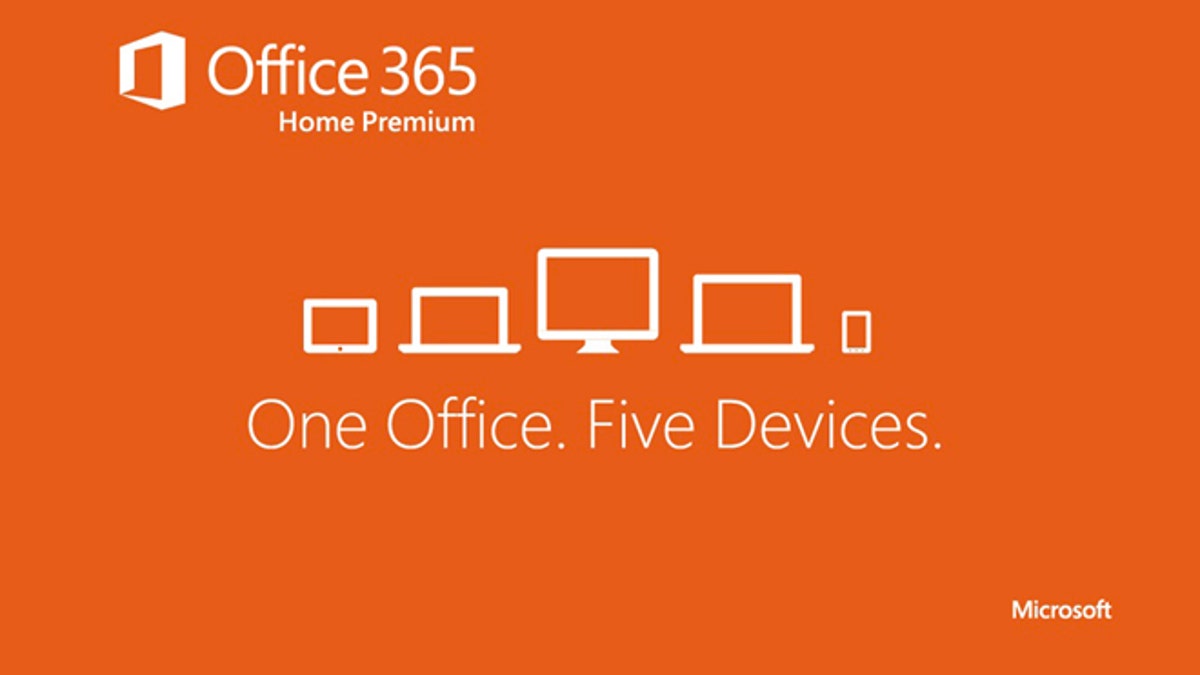
Jan. 29, 2013: Office 365 Home Premium -- a subscription version of the Office 2013 software -- works on up to five devices, including Windows tablets, PCs and Macs, Microsoft said. (Microsoft Corp.)
SAN FRANCISCO – Microsoft is selling a retooled version of its Office software to consumers as an online subscription service for the first time in an attempt to extend one of the company's key franchises beyond personal computers.
Tuesday's release comes six months after Microsoft previewed the new-look Office, which includes popular word processing, spreadsheets and email programs.
"This is a fundamental shift in our business that began a several years ago," Microsoft CEO Steve Ballmer wrote in a blog post.
'This is a fundamental shift in our business that began a several years ago.'
The revamped Office boasts touch controls, just like the redesigned version of the Windows operating system that Microsoft Corp. released three months ago. The company, which is based in Redmond, Wash., is trying to ensure that its products retain their appeal at a time when people increasingly rely on smartphones and tablet computers instead of PCs.
[pullquote]
To tap into that trend, Microsoft is promoting Office 2013 as a program tailor made for using over the Internet. All information is automatically stored in Microsoft's data centers, allowing for access to the same material on multiple devices. The content also can be stored on the hard drives of devices.
Yet Microsoft still isn't trying to get Office on the largest number of devices possible. Office 2013 doesn't include an option that works on Apple's iPhone and iPad or smartphones and tablets running the Android software made by Google. That leaves out the majority of smartphones and tablets sold in the past two years.
Microsoft is offering Office 2013 in a $100 annual subscription package, called 365 Home Premium, which includes online access on up to five Windows devices or Apple's line of Mac computers.
The company believes Office 2013 is currently best suited for Windows devices, said Chris Schneider, Microsoft's senior public relations manager for Office. Microsoft is limiting Office's reach as it tries to grab a bigger piece of the mobile market with its own operating system for smartphones and tablets.
Office will still be sold under a one-time licensing fee that allows the software to be installed on a single machine. Prices for that option start at $140 and range up to $400. People who don't need the entire Office bundle can buy individual programs such as Word, Excel and Outlook for $109 apiece. Microsoft outlines its pricing options in its online store at office.microsoft.com.
Office 2013 is the first overhaul of the software suite in three years.
The bundle of programs has become a staple on desktop and laptop computers, providing a rich vein of revenue for Microsoft.
The company has reaped most of its Office sales from licenses allowing buyers to install the suite of programs on individual machines, a very lucrative strategy. The Microsoft division anchored by Office generates about $24 billion in annual sales, accounting for nearly one-third of Microsoft's total revenue.
Revenue in the Office division fell from the previous year during the three months ending in December, partly because many prospective buyers have been awaiting the latest version.
Microsoft's stock dipped a penny to $27.90 in Tuesday's afternoon trading. The shares are stuck around the same price as when the company released Windows 8 to great fanfare three months ago. Meanwhile, the benchmark Standard & Poor's 500 has climbed by about 7 percent.
Besides getting access to the suite's programs, 365 Home Premium subscribers receive 20 additional gigabytes of storage on Microsoft's SkyDrive to supplement the 7 gigabytes that the company gives away to accountholders for free. Subscribers also will get 60 minutes of free international calls on Microsoft's Skype service for Internet phone calls and video chats.
College students and teachers will be able to buy Office 2013's online product for $80 for four years, which works out to about $1.67 per month. This option requires proof of student status. A variety of Office subscriptions are also being offered, with monthly fees ranging from $6 to $20 per user. More information can be found at Microsoft's website.
The online push reflects Microsoft's recognition that people want access to documents and email on whatever Internet-connected device they might have, wherever they may be, whether it's at work, home or a store while running errands.
"The technology needs to be able to move with you," Schneider said.
It's the first time that Microsoft has tried to persuade consumers that a recurring online subscription is the best way to buy and use Office. Microsoft had previously sold online Office subscriptions primarily to small businesses.
"Over time, the majority of the billion plus people using Office will be using the Office 365 service," Ballmer predicted in his blog post.
The attempt to sell online Office subscription to consumers comes nearly seven years after Google unveiled its own Internet bundle of word processing, spreadsheet and email programs. Google gives away a basic version of those applications, and charges subscriptions for more sophisticated packages aimed primarily at small businesses.
Microsoft's decision to reshape Office into an online service makes sense, although it may take customers a while to embrace the concept, said Edward Jones analyst Josh Olson. He suspects major companies that rely on Office probably will be among the last users to make the switch.
"This is a good innovation, but the uptake may be slow to begin because it is so different," Olson said.




















